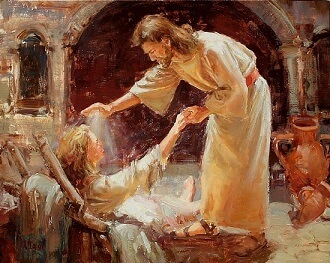 Exactly who is worthy of the kingdom of God? And exactly when is it proper to seek God’s mercy and healing?
Exactly who is worthy of the kingdom of God? And exactly when is it proper to seek God’s mercy and healing?
Two big issues addressed in today’s Gospel from Luke, where we witness a theological debate between Jesus and the leader of the synagogue.
In simple terms, Luke tells us that Jesus takes pity on a woman who had been suffering for 18 years, cures her of her affliction and then gets criticized for doing so on the Sabbath. It is an oft-used criticism by those seeking to trap Jesus into some sort of betrayal against the laws of Moses.
When you dig a little deeper into today’s episode, we see a little more happening.
In this one story from Luke, we see how Jesus begins to redefine what – or more importantly who – makes up the kingdom of God. Recall that at the time women were not permitted to worship God in the same manner and with the same privilege as men.
And yet …
“When Jesus saw her, he called to her and said, “Woman, you are set free of your infirmity.” He laid his hands on her, and she at once stood up straight and glorified God.”
Later, in his debate with the leader, Jesus goes further and identified the woman as a “daughter of Abraham.”
Think about it … up until this moment, the woman in our story today suffered from two things: She was a woman and she was crippled. When it came to the class system within the old faith, both women and the “impure” handicapped took a back seat to the men of good health.
In today’s Gospel, Jesus shows us that God’s kingdom was not only for men and not only for the healthy.
The woman was set free of her bondage. Jesus made good on the promise of God’s kingdom … that the bonds of evil, the “effects” of the fallen order will give way to a new Jerusalem. And, yes, this new Jerusalem would be more focused on the substance of God’s laws, not the strict interpretations of the leaders of the faith.
Which brings us to the debate over the Sabbath.
The synagogue leader challenges Jesus …
“There are six days when work should be done. Come on those days to be cured, not on the Sabbath day.”
But Jesus replies …
“Hypocrites! Does not each one of you on the Sabbath untie his ox or his ass from the manger and lead it out for watering? This daughter of Abraham, whom Satan has bound for eighteen years now, ought she not to have been set free on the Sabbath day from this bondage?”
God extends His love and mercy every day. He invites us to do the same with each other. Use your Sabbath wisely to reflect on this, but do not hold back when given the chance to respond to a call for compassion, should that call come on that day – or any day.
As we read more of the stories in Luke, our challenge is to pay attention to the “who-what-where-when” of Jesus’s miracles. You will see how Jesus bridges the faith of the “old religion” and the “new Jerusalem” through both obedience to God’s laws and a radical new way of thinking how they apply.
Jesus remains faithful to the promises that had been made to Israel, but he redefines the notion as to who will receive those promised gifts – opening them up to women, Gentiles, the unclean, the poor, Samaritans, rich tax collectors and an assortment of other “outcasts.”
No matter who they were – and who they are today – if they are humbly seeking God and walking in his ways, the kingdom shall be theirs.
Our job is help lead them and ourselves along that path.
